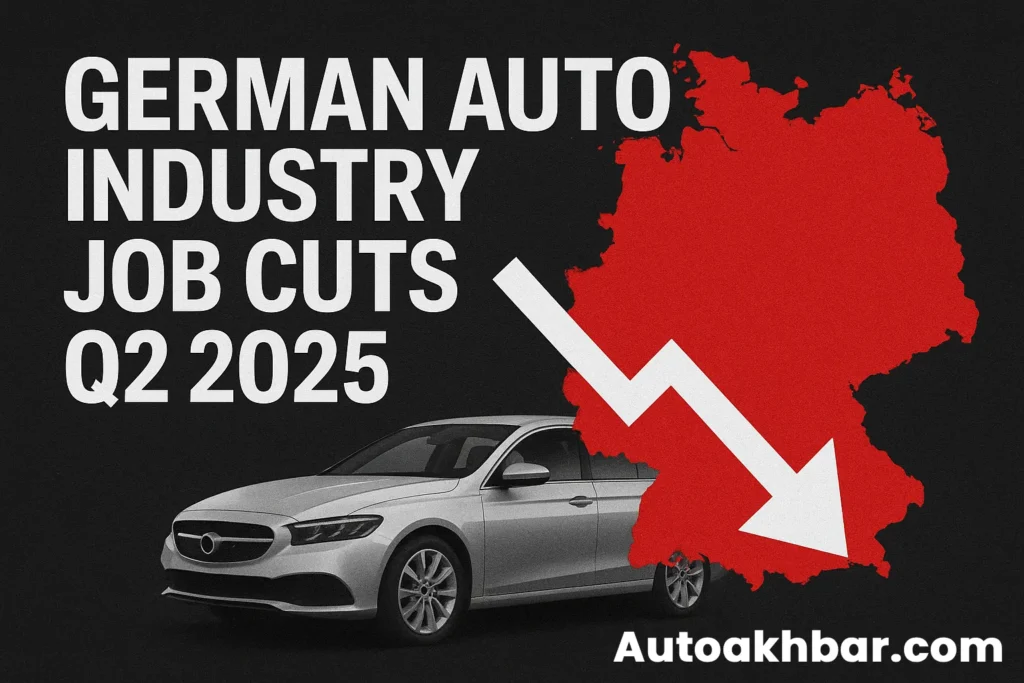Are German car companies in big trouble? It surely looks like it. Fresh reports show that the German auto industry has cut more than 51,500 jobs in just the last one year. This is not some small dip, this is a big shock for the world’s car hub. For decades, people trusted the tag “Made in Germany” as top quality. But now, the same industry is struggling to survive.

Table of Contents
How Big Are the Job Cuts?
According to a study by EY, nearly 7% of the auto industry workforce has been wiped out in 12 months. Out of total 114,000 jobs lost in German industry, almost half came only from the car sector. Since 2019, when things were normal before Covid, over 1.1 lakh auto jobs have disappeared.
So yes, Germany is still making cars, but the workforce behind those cars is shrinking fast.
Why Are German Auto Jobs Disappearing?
It’s not just one problem, it’s a full mix of issues:
- China ka competition – Chinese companies are making cheaper and smarter electric cars, taking away market share.
- US tariffs – America has added new duties on German cars, making them costly for buyers.
- German red tape – Local carmakers say government rules and delays are slowing EV growth.
- Economy slowdown – Germany’s GDP fell in 2023 and 2024. In 2025 also, the economy is almost flat.
In short, the German auto industry is feeling pressure from all sides.
Germany Electric Car Subsidy 2025
China’s New Luxury Tax – Big Trouble for Mercedes & BMW
Last month, China introduced a luxury car tax. This directly hits German premium brands like Mercedes, BMW, and Audi. On top of this, local Chinese EV brands are giving buyers more features at a lower price. No surprise then that German auto exports to China dropped 14% in the first half of 2025.
US Tariffs Make It Worse
The United States, another big market for German cars, has slapped 15% tariff on imported cars. As a result, exports to the US fell 8.6% this year. For American buyers, a German car now costs more. And for German automakers, selling in the US has become less profitable.
Profits Falling, Revenues Sliding
Germany’s overall industry revenues dropped 2.1% in Q2 2025. For auto companies, the fall was about 2%. But profits have fallen even harder. Volkswagen, for example, reported a big drop in Q2 profit and cut its yearly forecast. Others are also struggling with higher costs and weaker demand.
Long-Term Decline Since 2019
This is not only a 2025 problem. Since 2019, German carmakers have cut more than 1.12 lakh jobs. That’s like the whole city of a small town losing its employment. It clearly shows that the industry is going through long-term pain, not just temporary slowdown.
What Does This Mean for Buyers Like Us?
If you are a car lover in India or anywhere else, this trend could mean:
- German cars may become more costly, thanks to tariffs and restructuring.
- Less new models, as companies slow down launches.
- Slower EV tech from Germany, because they are struggling to keep up with Chinese EV makers.
So in simple words, buyers may have to pay more but get fewer options.
Can Germany Bounce Back?
Experts say German carmakers will have to cut more costs, push EVs faster, and reduce bureaucracy if they want to compete. But with falling demand in China and tariffs in the US, the road looks very tough.
Conclusion – The Storm Is Just Starting
The German auto industry job cuts analysis Q2 2025 is like the tip of an iceberg. What we see now—job losses, revenue dips, export drops—is only the beginning. Unless German automakers adapt quickly, even bigger cuts may come in the near future.
For workers, for buyers, and for the global auto market, all eyes are on Germany.
FAQs ON German Auto Industry Job Cuts (Q2 2025)
Why is the German auto industry cutting so many jobs in 2025?
The main reason is the slowdown in car demand, rising competition from electric vehicle makers (like Tesla and BYD), and the high cost of maintaining traditional factories. Companies are restructuring to focus more on EVs and automation.
How many workers lost jobs in the German auto sector this year?
In Q2 2025 alone, nearly 52,000 workers were laid off across different auto brands and suppliers in Germany.
Are electric cars responsible for these job losses?
Partly yes. EVs require fewer moving parts and less labour to build compared to petrol/diesel cars. So, as companies shift production, traditional jobs are being cut.
Will these job cuts affect car prices in India?
Directly, no. But globally, if German carmakers reduce production or face cost pressure, it can impact their export prices. Indian buyers of brands like BMW, Mercedes, and Volkswagen may see slow model updates or higher costs.
Can the German auto workers get new jobs quickly?
Some may be re-trained for EV and battery manufacturing roles, but the transition is not easy. Skilled workers might find opportunities, but older employees could struggle.
Hello guys!
I came across a 143 awesome website that I think you should take a look at.
This site is packed with a lot of useful information that you might find valuable.
It has everything you could possibly need, so be sure to give it a visit!
Additionally remember not to neglect, everyone, which you constantly may in the piece discover answers for your the absolute complicated queries. We attempted — present all information in the most most accessible method.